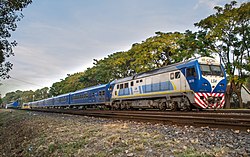San Martín Line (Buenos Aires)
 |
|||||

A CSR SDD7 train leaving Villa Devoto station.
|
|||||
| Overview | |||||
|---|---|---|---|---|---|
| Service type | Commuter rail | ||||
| Status | Active | ||||
| Locale | Buenos Aires Province | ||||
| Predecessor | BA & Pacific R. | ||||
| First service | 1948 | ||||
| Current operator(s) | SOFSE | ||||
| Former operator(s) | Corredores Ferroviarios | ||||
| Annual ridership | 39,240,000 (2014) | ||||
| Website | San Martín Line | ||||
| Route | |||||
| Start | Retiro | ||||
| Stops | 22 | ||||
| End | Dr. Cabred | ||||
| Distance travelled | 72.5 km | ||||
| Average journey time | 75' | ||||
| Service frequency | 15' | ||||
| On-board services | |||||
| Class(es) | Standard class only | ||||
| Technical | |||||
| Track gauge | 1,676 mm (5 ft 6 in) | ||||
|
|||||
| Route map | |
|---|---|
 |
The San Martín line is a 70-kilometre (43 mi), 22-station commuter rail service in the metropolitan area of Buenos Aires, Argentina. The San Martín line operates from the city-centre terminus of Retiro north-west to Doctor Cabred in Luján Partido along a broad gauge line built by the British-owned Buenos Aires and Pacific Railway.
The line is currently operated by State-owned company Operadora Ferroviaria Sociedad del Estado (SOFSE) after the Government of Argentina rescinded the contract with former operator Corredores Ferroviarios in March 2015. Passenger numbers in 2015 beat historical records for the line, which has been largely attributed to the newer rolling stock and refurbished stations.
The first line had been built and operated by the Buenos Aires and Pacific Railway, a British-owned company. The original projects included a railway to connect Argentina and Chile, but instead the BAPR focused on getting access to Buenos Aires. When the Government of Argentina granted concession to build the line, the company opened a 100-km length Mercedes−Palermo segment.
On 13 February 1947, the Government of Argentina acquired the Buenos Aires and Pacific Railway, changing its name to Ferrocarril General San Martín one year later when the entire Argentine railway network nationalised by Juan Perón's administration. Immediately after nationalisation, there was a project to electrify the line, however this never came to fruition.
...
Wikipedia
